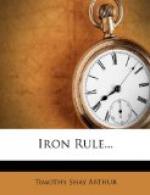During that day, Andrew was absent from school. Having twice missed his gentle friend, he had no heart to enter upon his studies, and so went listlessly wandering about the streets until nearly twelve o’clock. Then he repaired to the neighborhood of her school, and waited to see if she was among the scholars at the time of their dismissal. In a little while the children came pouring forth, and among them his eager eyes soon caught the form of Emily. He was by her side in a moment, saying, as he took her hand—
“Where have you been? I’ve looked for you these two days.”
A crimson flush overspread the face of Emily in an instant, and she gently disengaged the hand he had taken.
Andrew, who, with all his faults, was proud and sensitive, seemed startled by this unexpected reception. For a moment or two he stood gazing upon her downcast face, and then turned from her and walked rapidly away. As he did so, the little girl lifted toward him her gentle eyes, that were now full of tears, and stood gazing after him with a sad expression of countenance until he was out of sight.
“I don’t care for anything now!” Such was the ejaculation of Andrew, pausing, and throwing himself, with a reckless air, upon a door-step, so soon as he had passed beyond the view of the friend he had so loved for years, but who now, from some cause unknown to him, had become suddenly estranged. “I don’t care for anything now,” he repeated. “Let them send me to sea, or anywhere else, if they will! I don’t care! I’m not going to school any more! What do I care for school? I do nothing right, any how! It’s scold, scold, or flog, flog, all the time! Father says he’ll beat goodness into me; but I guess he’s beaten it ’amost all out”
With such thoughts passing through his mind, the unhappy boy sat, with his face down, and his head supported on his hands, for some two or three minutes, when he was startled by a well-known voice, whose tones were ever like music to his ears, pronouncing his name.
In an instant he was on his feet. Emily was before him, and her eyes were now fixed upon his face with a sad expression.
“Andrew,” said she, “don’t be angry. It isn’t my fault.”
“What isn’t your fault?” eagerly inquired the boy, as he grasped her hand.
“Father said I mustn’t—”
The little girl hesitated. It seemed as if she couldn’t utter the words.
“Said what?”
There was ill-repressed indignation in Andrew’s voice.
“Don’t be angry! It frightens me when you are angry!” said Emily, looking distressed.
“What did your father say?” asked the boy, in milder tones.
“He said that I mustn’t meet you as I went to school any more,” replied Emily.
The face of the boy grew crimson, while his lips arched with the angry indignation that swelled in his bosom. He was about giving a passionate vent to his feelings, when he was restrained by the look of distress that overspread the face of his gentle friend, and by the tears that came slowly stealing from her eyes.




